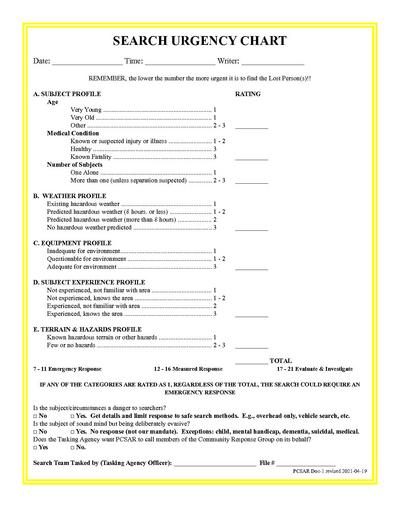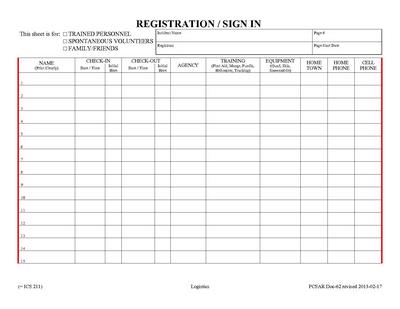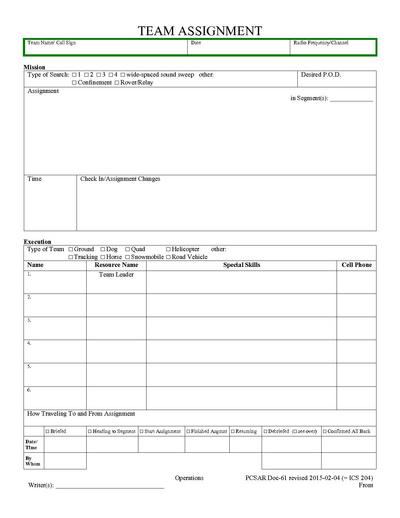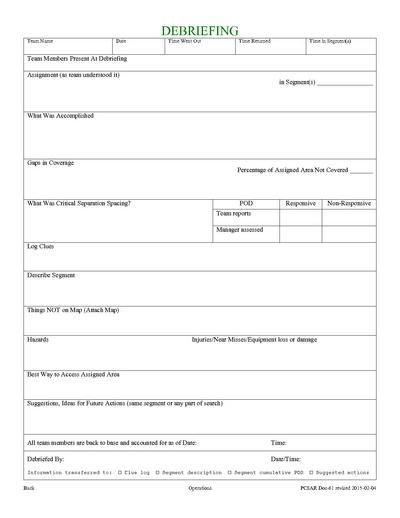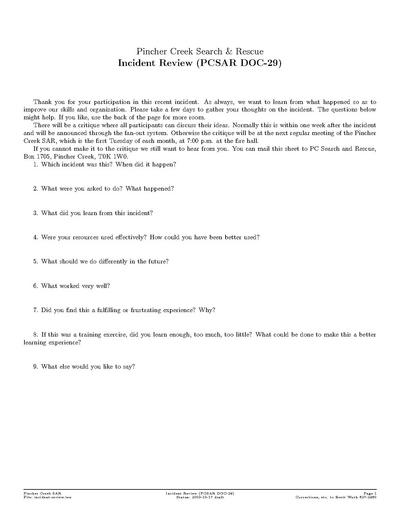SAR Fundamentals/Incident anatomy/Part 1
From PCSAR
(→Aids) |
|||
| (27 intermediate revisions not shown.) | |||
| Line 1: | Line 1: | ||
| - | + | {{Lesson plan/Header}} | |
| - | + | ||
| - | + | ||
| - | + | ||
| - | + | ||
| - | + | ||
| - | + | ||
| - | + | ||
| - | + | ||
| - | + | ||
| - | + | ||
| - | + | ||
| - | + | ||
| - | + | ||
| - | + | ||
| - | + | ||
| - | + | ||
| - | + | ||
| - | + | ||
| - | + | ||
| - | + | ||
| - | + | ||
| - | + | ||
| - | + | ||
| - | + | ||
| - | + | == Subject == | |
| + | {{prompt|What is this lesson plan about?}} | ||
| + | == Authors == | ||
| + | {{prompt|List who wrote this lesson plan.}} | ||
| - | + | Brett Wuth, Jake Waiboer | |
| - | + | == Scope == | |
| - | * | + | {{prompt|What is included in this lesson, what's not and why.}} |
| - | * | + | SAR Fundamentals Manual: |
| - | * | + | * Search and Rescue Fundamentals |
| + | ** Ch.1 "SAR, What is It and How Do You Fit In?" | ||
| + | ** Ch.20 "Anatomy of a SAR Incident" | ||
| + | ** Appendix A "Urgency Determination Form" | ||
| + | ** Appendix D "Briefing and Debriefing Checklist" | ||
| + | * SAR Skills Handbook | ||
| + | ** Ch 2 "SAR Overview" (page A-5) | ||
| - | + | == Objectives == | |
| + | At the conclusion of this lesson the participants: | ||
| + | # will understand the overall flow of an incident | ||
| - | + | == Time Plan == | |
| + | Total Time: 70 minutes | ||
| + | : 2003-10-18 10:22 - 11:35 : 1.3h | ||
| + | : 2010-03: 2010-03 64min | ||
| - | |||
| - | + | {{lesson slides start}} | |
| - | + | {{lesson slide|00:00|3 min}} | |
| - | + | Introduce topic title | |
| - | + | ||
| - | + | ||
| - | + | Introduce Instructor | |
| - | + | ||
| - | + | Material Covered: | |
| - | + | : Chapter 20: Anatomy of an Incident p.279 | |
| - | + | Present Objectives | |
| - | + | ||
| - | + | {{lesson slide|00:03|}} | |
| - | + | ||
| - | + | ||
| - | + | * ''Play video'' | |
| + | * Is that wat you think a search would be like? | ||
| + | * Actors are real SAR people doing their normal roles. | ||
| + | * Math | ||
| + | * What do you think happened? | ||
| + | * What roles did you see SAR volunteers doing | ||
| + | * ''people | ||
| + | ** ''Grandfather: Jim Cradock | ||
| + | ** ''Grandson: Mike Hogan | ||
| + | ** ''Agency Executive: Barry | ||
| + | ** ''Incident Command: Dave | ||
| - | + | {{lesson slide||}} | |
| + | What were the 4 phases of a search? | ||
| + | : ''(discussed in introductory section)'' | ||
| - | |||
| - | A | + | * L - Locate |
| + | * A - Access | ||
| + | * S - Stabalize | ||
| + | * T - Transport | ||
| + | or | ||
| - | + | * S - Search | |
| - | + | * A - Access | |
| + | * M - Medical | ||
| + | * E - Evacuate | ||
| - | + | ''discuss how those phases were (or weren't) seen in the video'' | |
| - | + | ||
| - | + | ||
| - | + | ||
| - | + | {{lesson slide||}} | |
| + | Being ready for a search | ||
| - | + | Before the searchers can arrive what needs to happen? | |
| - | + | ||
| - | + | ||
| - | + | ''lead group in discussion that draws out these components of search:'' | |
| - | + | ||
| - | + | Strategy - determine what needs to be done | |
| - | + | ||
| - | + | ||
| + | preceeded by | ||
| - | + | Notification - group being alerted to situation | |
| - | + | ||
| - | + | ||
| - | + | preceeded by | |
| - | + | ||
| - | + | Preplan - planning for a possible incident, preparing people and equipment | |
| - | + | ||
| - | + | {{lesson slide||}} | |
| - | + | What happens after the search? | |
| - | + | ''lead group in discussion that draws out these components of search:'' | |
| - | + | ||
| - | + | Suspension - decision to end the search, demobilization | |
| - | + | ||
| - | |||
| - | + | So what if you found you didn't have the right equipment? Weren't prepared? | |
| - | + | ||
| - | + | ||
| - | + | ||
| - | + | ||
| - | + | ||
| - | + | ||
| - | + | Fix it ''(feed back loop)'' | |
| - | + | How would you know all the things needing fixing? | |
| - | + | ||
| - | + | ||
| - | + | Critique - gathering lessons learned | |
| - | + | {{lesson slide||}} | |
| - | + | [[Image:Members:2012-02-16 03 13 20u-scan.pdf|page=1|right|400px]] | |
| - | + | The SAR event cycle | |
| - | * | + | * ''SAR Fund Slide - Basic SAR 6'' |
| - | + | ''draw or show the complete cycle, discuss'' | |
| - | + | ||
| - | + | {{lesson slide||2 min}} | |
| - | + | Preplan (Planning/Preparation) | |
| - | + | * Most of the work of a SAR organization | |
| - | + | ||
| - | + | * Identifying needs | |
| - | + | ||
| + | * Training (like this course), practicing | ||
| - | + | * Fund raising for equipment | |
| - | |||
| - | |||
| - | + | {{lesson slide||}} | |
| - | {{ | + | Notification |
| - | + | * Initial contact is very important, the impression you leave with the reporting person. | |
| - | + | * The attitude of the report taker | |
| + | * Name and call back number/location of the reporting party. | ||
| + | * Don't let the reporting party leave. | ||
| - | + | Notification of the group | |
| - | + | * ''PCSAR DOC-80 Incident Notification Process'' | |
| - | + | * ''trace message from public to PCSAR manager'' | |
| - | + | * Tasking agency notified first | |
| - | + | * Use of 24 hour professional answering service: STARS | |
| + | * Redundant communications lines | ||
| + | * Informal communications: ~50% of calls - small town | ||
| - | + | Notification of individual searchers | |
| - | + | * ''PCSAR DOC-67 Emergency Call Out Procedure'' | |
| - | + | * use of call-out personnel | |
| + | ** personal phone call in the middle of the night | ||
| + | ** adopting automated telephone system | ||
| + | * list of basic information searchers should get | ||
| - | + | Rare occassions not tasked | |
| + | * ''give 1 example'' | ||
| - | + | {{lesson slide||}} | |
| - | {{lesson slide| | + | Strategy |
| - | + | [[Image:Doc-001-search-urgency.pdf|right|400px]] | |
| + | ** ''PCSAR DOC-1 Search Urgency'' | ||
| + | |||
| + | * Priority of the mission | ||
| + | * Investigation procedures | ||
| + | * Plan Tactics/Operations | ||
| + | ** Tactics | ||
| + | |||
| + | |||
| + | {{lesson slide||}} | ||
| + | Tactics / Operations | ||
| + | [[Image:Members:2012-02-16 03 13 20u-scan.pdf|page=4|right|400px]] | ||
| + | * ''SAR Fund slide: Basic SAR 580'' | ||
| + | |||
| + | Inner cycle: | ||
| + | |||
| + | * Check in (Sign-In) | ||
| + | |||
| + | * Briefing | ||
| + | |||
| + | * Assignment | ||
| + | |||
| + | * Debriefing | ||
| + | |||
| + | * Check out (Sign-Out) | ||
| + | |||
| + | [[Image:Doc-062-registration-sign-in.pdf|right|400px]] | ||
| + | * ''[[PCSAR DOC-62 Registration/Sign-In]]'' | ||
| + | |||
| + | {{lesson slide||}} | ||
| + | Check-in | ||
| + | * May be verbal, although PC SAR requires physical sign in. | ||
| + | * When and where you check in, is when you find out where to go i.e., debriefing etc. | ||
| + | * Get your check in details during the call out. (don't be afraid to ask) | ||
| + | |||
| + | |||
| + | |||
| + | {{lesson slide||}} | ||
| + | Briefing | ||
| + | |||
| + | Why do we need a briefing? | ||
| + | |||
| + | 1. Controlled by the mgmt., team. | ||
| + | * The plans chief or assistant or the Manager may give you your briefing. | ||
| + | * Done before shift | ||
| + | * Should get all maps and info. | ||
| + | ** Again don't be afraid to ask questions. | ||
| + | |||
| + | [[Image:Members:Doc-086-briefing-handout.pdf|page=1|right|400px]] | ||
| + | [[Image:Members:Doc-086-briefing-handout.pdf|page=2|right|400px]] | ||
| + | * ''[[PCSAR DOC-86 Briefing Handout]]'' | ||
| + | |||
| + | [[Image:Doc-061-task-assignment-and-debriefing.pdf|page=1|right|400px]] | ||
| + | * ''[[PCSAR DOC-61 Task Assignment and Debriefing]]'' | ||
| + | |||
| + | Components of a briefing: SMEAC | ||
| + | * Situation | ||
| + | * Mission | ||
| + | * Execution | ||
| + | * Administration | ||
| + | * Communications | ||
| + | |||
| + | Pincher SAR radio "5-codes" | ||
| + | |||
| + | |||
| + | |||
| + | 2. info you should receive, if not ask. | ||
| + | * Status, objectives, strategies, predictions | ||
| + | * Subject info, complete physical description, clothing, etc., | ||
| + | * physical & mental cond., behavior traits, circumstances. | ||
| + | * Clue considerations, shoe, items carried, and how to handle them if found. | ||
| + | * Trip plans | ||
| + | * Terrain | ||
| + | * Weather (should have found this out during call-out). | ||
| + | * Equipment needed by you, other than SAR Pack. | ||
| + | * Comm., details | ||
| + | * Drop dead time. (return to base) | ||
| + | * Transport, how are you getting to your search area? | ||
| + | * External influences. | ||
| + | * Tactical details- search techniques. | ||
| + | * Mgmt., overview | ||
| + | * Safety inst. | ||
| + | * Team injuries & how to handle them. | ||
| + | |||
| + | {{lesson slide||}} | ||
| + | Assignment | ||
| + | |||
| + | Each individual and each team has certain responsibilities. All of | ||
| + | these need to be decided before you go into the field. | ||
| + | * team leader | ||
| + | * radio | ||
| + | * navigation | ||
| + | * note taker/time keeper | ||
| + | * first aid | ||
| + | * etc. | ||
| + | one person can have more than one responsibility | ||
| + | |||
| + | |||
| + | {{lesson slide||}} | ||
| + | Debriefing | ||
| + | |||
| + | [[Image:Doc-061-task-assignment-and-debriefing.pdf|page=2|right|400px]] | ||
| + | ''back side of DOC-61'' | ||
| + | |||
| + | |||
| + | The Planning Section Chief is in charge of seeing the debriefing is | ||
| + | done correctly. | ||
| + | |||
| + | The team leader may debrief his team first then be debriefed | ||
| + | |||
| + | The debriefing should be done in writing & with verbal. | ||
| + | |||
| + | The Team is responsible for: | ||
| + | * Explicit descriptions of the areas covered and activities. | ||
| + | * Estimate of POD is required. ( must know how to calculate) | ||
| + | * Difficulties with the search. | ||
| + | * Hazards | ||
| + | * Suggestions. | ||
| + | * Feel free to use any method of relaying the proper info. | ||
| + | * The info you provide is very important to setting up the next search area's, POA, POD, and POS. | ||
| + | |||
| + | |||
| + | {{lesson slide||}} | ||
| + | Check Out | ||
| + | * PC SAR requires physical check-out on paper with time. | ||
| + | |||
| + | {{lesson slide||}} | ||
| + | Suspension | ||
| + | |||
| + | * decision process | ||
| + | |||
| + | * ''[[PCSAR DOC-74 Search Incident Demobilization / Post Mission Plan]]'' | ||
| + | |||
| + | * demobilization | ||
| + | |||
| + | * sign-out | ||
| + | |||
| + | * safe travel | ||
| + | |||
| + | * return to service | ||
| + | |||
| + | |||
| + | Individuals: | ||
| + | * Are you ready to go into the field again, and if not how long? | ||
| + | |||
| + | |||
| + | {{lesson slide||}} | ||
| + | Critique | ||
| + | |||
| + | * doesn't mean criticism | ||
| + | * want to learn as much as possible | ||
| + | * excellent learning opportunity even for those that didn't attend | ||
| + | [[Image:Doc-29-incident-review.pdf|right|400px]] | ||
| + | * ''[[PCSAR DOC-29 Incident Review]]'' | ||
| + | |||
| + | * PC SAR has a critique after nearly every search. | ||
| + | |||
| + | {{lesson slide||}} | ||
| + | Questions. | ||
| + | |||
| + | ''Collect question bank cards.'' | ||
| - | |||
{{lesson slides end}} | {{lesson slides end}} | ||
| + | * 20:30 video bad | ||
| + | * drop LAST/SAME from "Roles" chapter | ||
| + | * see {{nbw|2016|10|26}} | ||
== Aids == | == Aids == | ||
{{prompt|What materials are needed or useful in presenting this lesson.}} | {{prompt|What materials are needed or useful in presenting this lesson.}} | ||
| + | |||
| + | * projection screen | ||
| + | * video project | ||
| + | * video player | ||
| + | * video - Search Management | ||
| + | * Hand-Outs (copy for each student) | ||
| + | ** [[PCSAR DOC-80 Incident Notification Process]] | ||
| + | ** [[PCSAR DOC-67 Emergency Call Out Procedure]] | ||
| + | ** [[PCSAR DOC-1 Search Urgency]] | ||
| + | ** [[PCSAR DOC-62 Registration/Sign-In]] | ||
| + | ** [[PCSAR DOC-86 Briefing Handout]] | ||
| + | ** [[PCSAR DOC-61 Task Assignment and Debriefing]] | ||
| + | ** [[PCSAR DOC-74 Search Incident Demobilization / Post Mission Plan]] | ||
| + | ** [[PCSAR DOC-29 Incident Review]] | ||
| + | * overhead projector | ||
| + | * slides for this section | ||
| + | ** {{link|Image:Members:SAR-Fundamentals-Incident-Anatomy-Part-1-slides.pdf}} | ||
| + | |||
| + | * Video - Search Management, Part 1 - "Initial Response" - 28 min | ||
| + | * Slides | ||
| + | ** Basic SAR 579 | ||
| + | ** Basic SAR 60 | ||
| + | ** optional: | ||
| + | *** Basic SAR 581 | ||
| + | *** Basic SAR 583 | ||
| + | *** Basic SAR 584 | ||
| + | *** Basic SAR 589 | ||
| + | *** Basic SAR 595 | ||
| + | *** Basic SAR 598 | ||
| + | *** Basic SAR 596 | ||
| + | *** Basic SAR 599 | ||
| + | *** Basic SAR 604 | ||
| + | *** Basic SAR 608 | ||
| + | *** Basic SAR 597 | ||
| + | *** Basic SAR 610 | ||
| + | *** Basic SAR 605 | ||
| + | |||
| + | * FOG SAR [[:Image:Members:FOG-SAR-slides-010-chapter-1.odp|slides 010+ Chapter 1 (odp)]] [[:Image:Members:FOG-SAR-slides-010-chapter-1.pdf|(pdf)]] - SAR Overview | ||
| + | * {{link|Members:SAR Fundamentals/Restricted/Ralph Eckman 2013-01}} | ||
| + | * {{link|Image:Members:2013-02-27 19 33 11u-scan.pdf}} | ||
| + | * {{link|Image:Members:2013-02-27 19 34 41u-scan.pdf}} | ||
== Question bank == | == Question bank == | ||
{{prompt|List of questions suitable for an review/exam of this section.}} | {{prompt|List of questions suitable for an review/exam of this section.}} | ||
| + | See {{subpage|Question bank}} | ||
| + | |||
== Frequently Asked Questions == | == Frequently Asked Questions == | ||
{{prompt|What are some of the questions that students typically ask. Include the answers.}} | {{prompt|What are some of the questions that students typically ask. Include the answers.}} | ||
| Line 186: | Line 374: | ||
== Feedback == | == Feedback == | ||
{{prompt|When has this lesson been presented. What was the feedback.}} | {{prompt|When has this lesson been presented. What was the feedback.}} | ||
| + | |||
| + | 2004-09-07 Wuth presentation at PCSAR regular meeting | ||
== License == | == License == | ||
{{prompt|What can others do with this lesson?}} | {{prompt|What can others do with this lesson?}} | ||
| - | + | Copyright © 2004-2012, Brett Wuth. | |
| - | + | ||
| - | Copyright © | + | |
This work is licensed under a | This work is licensed under a | ||
Creative Commons Attribution-NonCommercial 2.5 Canada License. | Creative Commons Attribution-NonCommercial 2.5 Canada License. | ||
| Line 206: | Line 394: | ||
== Notes == | == Notes == | ||
{{prompt|Any additional notes, etc.}} | {{prompt|Any additional notes, etc.}} | ||
| + | |||
| + | some of this material is from Jake Waiboer | ||
| + | |||
| + | == To do == | ||
| + | Create a slide for ~info you should receive, if not ask.~ | ||
Current revision
Contents |
[edit] Subject
What is this lesson plan about?
[edit] Authors
List who wrote this lesson plan.
Brett Wuth, Jake Waiboer
[edit] Scope
What is included in this lesson, what's not and why.
SAR Fundamentals Manual:
- Search and Rescue Fundamentals
- Ch.1 "SAR, What is It and How Do You Fit In?"
- Ch.20 "Anatomy of a SAR Incident"
- Appendix A "Urgency Determination Form"
- Appendix D "Briefing and Debriefing Checklist"
- SAR Skills Handbook
- Ch 2 "SAR Overview" (page A-5)
[edit] Objectives
At the conclusion of this lesson the participants:
- will understand the overall flow of an incident
[edit] Time Plan
Total Time: 70 minutes
- 2003-10-18 10:22 - 11:35 : 1.3h
- 2010-03: 2010-03 64min
| Time | Material
|
|
00:00 3 min |
Introduce topic title Introduce Instructor Material Covered:
Present Objectives
|
|
00:03
|
|
|
|
What were the 4 phases of a search?
or
discuss how those phases were (or weren't) seen in the video
|
|
|
Being ready for a search Before the searchers can arrive what needs to happen? lead group in discussion that draws out these components of search: Strategy - determine what needs to be done preceeded by Notification - group being alerted to situation preceeded by Preplan - planning for a possible incident, preparing people and equipment
|
|
|
What happens after the search? lead group in discussion that draws out these components of search: Suspension - decision to end the search, demobilization
Fix it (feed back loop) How would you know all the things needing fixing? Critique - gathering lessons learned
|
|
|
The SAR event cycle
draw or show the complete cycle, discuss
|
|
|
Preplan (Planning/Preparation)
|
|
|
Notification
Notification of the group
Notification of individual searchers
Rare occassions not tasked
|
|
|
Strategy
|
|
|
Tactics / Operations
Inner cycle:
|
|
|
Check-in
|
|
|
Briefing Why do we need a briefing? 1. Controlled by the mgmt., team.
Components of a briefing: SMEAC
Pincher SAR radio "5-codes"
2. info you should receive, if not ask.
|
|
|
Assignment Each individual and each team has certain responsibilities. All of these need to be decided before you go into the field.
one person can have more than one responsibility
|
|
|
Debriefing back side of DOC-61
The team leader may debrief his team first then be debriefed The debriefing should be done in writing & with verbal. The Team is responsible for:
|
|
|
Check Out
|
|
|
Suspension
|
|
|
Critique
|
|
|
Questions. Collect question bank cards.
|
- 20:30 video bad
- drop LAST/SAME from "Roles" chapter
- see Brett's 2016-10-26 notes
[edit] Aids
What materials are needed or useful in presenting this lesson.
- projection screen
- video project
- video player
- video - Search Management
- Hand-Outs (copy for each student)
- PCSAR DOC-80 Incident Notification Process
- PCSAR DOC-67 Emergency Call Out Procedure
- PCSAR DOC-1 Search Urgency
- PCSAR DOC-62 Registration/Sign-In
- PCSAR DOC-86 Briefing Handout
- PCSAR DOC-61 Task Assignment and Debriefing
- PCSAR DOC-74 Search Incident Demobilization / Post Mission Plan
- PCSAR DOC-29 Incident Review
- overhead projector
- slides for this section
- Video - Search Management, Part 1 - "Initial Response" - 28 min
- Slides
- Basic SAR 579
- Basic SAR 60
- optional:
- Basic SAR 581
- Basic SAR 583
- Basic SAR 584
- Basic SAR 589
- Basic SAR 595
- Basic SAR 598
- Basic SAR 596
- Basic SAR 599
- Basic SAR 604
- Basic SAR 608
- Basic SAR 597
- Basic SAR 610
- Basic SAR 605
- FOG SAR slides 010+ Chapter 1 (odp) (pdf) - SAR Overview
- Ralph Eckman 2013-01
- Chapter 20 outline Jorgensen/Waiboer
- Appendix A outline Jorgenses/Waiboer
[edit] Question bank
List of questions suitable for an review/exam of this section.
See Question bank
[edit] Frequently Asked Questions
What are some of the questions that students typically ask. Include the answers.
[edit] Feedback
When has this lesson been presented. What was the feedback.
2004-09-07 Wuth presentation at PCSAR regular meeting
[edit] License
What can others do with this lesson?
Copyright © 2004-2012, Brett Wuth.
This work is licensed under a
Creative Commons Attribution-NonCommercial 2.5 Canada License.
To view a copy of this license, visit
http://creativecommons.org/licenses/by-nc/2.5/ca/
or send a letter to Creative Commons, 559 Nathan Abbott Way, Stanford, California 94305, USA.
[edit] Reference Material
If you need to cite sources, do so here.
[1]
[edit] Notes
Any additional notes, etc.
some of this material is from Jake Waiboer
[edit] To do
Create a slide for ~info you should receive, if not ask.~

